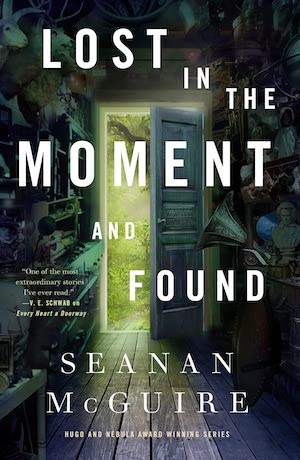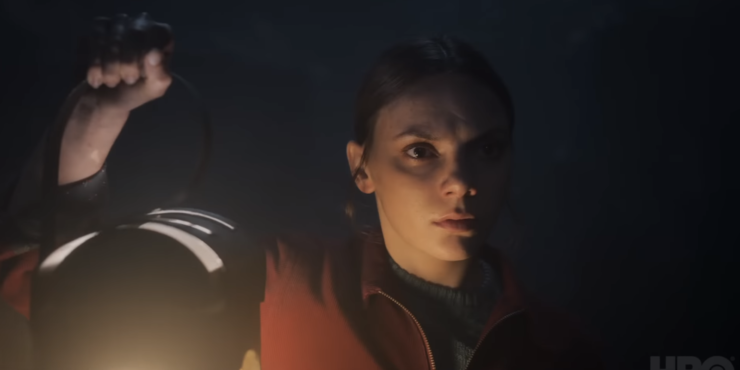When I wrote about the first two episodes of this final season of His Dark Materials, I said that it had a tough job ahead of it, needing to stick the book’s impeccable landing while also making up for the final installment’s pacing issues and story problems. The question now is, did it succeed in its lofty goals? Sort of. Enough. It is likely the best version of Philip Pullman’s novels that could be made without a major reworking of the story. It’s also anchored by an embarrassment of riches when it comes to its cast. So let’s look at what worked and what didn’t in this final season.
The Bad
First off, let’s look at the shortcomings of these last eight episodes. Most of what explicitly didn’t work in this final season was a direct result of the source material.
Pacing: The Amber Spyglass, the book on which this final season is based, is an absolute mess. It pivots away from many of the fun and fantastical elements of his previous books (armored bears! specters!) for a long slog in the land of the dead and a long meditation on Mulefa evolution while the major events of Lord Asriel’s rebellion are left off the page. The show did the best job it could with these structural flaws. It cut down Mary Malone’s time with the Mulefa to something essential and largely unreflected upon. It spent an admirable amount of time with Asriel and Mrs. Coulter, giving his rebellion depth and nuance that paid off in the end. It still spent far too much time in the land of the dead.
Overall, the changes made to pacing and the characters they chose to emphasize (there is considerably more in the final season with Iorek Byrnison than in the final book) weren’t quite enough to overcome the source material’s shortcomings. The show was far more interesting when it returned to new material with Asriel and Mrs. Coulter, leaving the audience to wonder why it couldn’t find a more solid hook for Lyra and Will for the majority of the season.
No Clear Villain: It is true that there is something to be said for the ways in which both the novels and the show highlight the insidious nature of authoritarian religions by de-emphasizing any single villainous figure in favor of foregrounding the system itself. Will Keen’s institution-climbing Cardinal MacPhail, Jamie Ward’s zealous assassin Father Gomez, and Alex Hassell’s man-behind-the-curtain acting as Metatron all take their turns as the season’s primary antagonist but the end result is less of a clear understanding of Pullman’s anti-establishment views on religion, and more of a revolving door of villains to whom we have to quickly recalibrate as each succeeds the other as the biggest monster.
This is also a problem insofar as it makes Marisa Coulter and Lord Asriel’s own redemption arcs harder to buy. The show lands closer with Coulter than Asriel but that is mostly because the series has had three seasons to build a complicated character who may not be redeemable but is, at the very least, dynamic and increasingly aware of her own mistakes. Asriel’s similar journey feels rushed and very last-minute by comparison. Perhaps giving Metatron more to do in the final season might have allowed him to be a more three-dimensional character.
Who Is This For? At the core of the series, however, lies a problem that it shares with the novels—who is the intended audience? Pullman insists that it is a middle-grade trilogy and, certainly, the first book in the series functions pretty well in that regard. But by the end of the narrative, the series doesn’t have much to offer a child. Its theocratic arguments feel too complex for the reading level of the books. It meditates on existential dread in a way that will either go right over a child’s head or else give them nightmares for years. Even its much lauded ending was censored in American versions of the book for being too explicitly sexual. While one can certainly debate the merits of that decision, it is also clear that the book was veering in a far too adult direction.
Certainly, the show is not for children. It feels squarely aimed at an adult audience, especially in this final season where the imagery tends to be gruesome and upsetting and so much of the plot is spent with adult characters struggling with complicated ideas about religion, war, and parenthood. All that said, the amount of time spent with Lyra and Will (who both have aged a bit too much to convincingly play the pre-teens that they were meant to be) and their childlike lack of understanding, means that the narrative becomes unintentionally frustrating on occasion as we repeatedly return to their circular conversations and under-considered solutions.
The Good
There was quite a bit to enjoy in the last season, even if it couldn’t quite transcend its source material.
Fixing the Mulefa: In my initial article for this season I was quite worried about the depiction of the Mulefa—the elephantine aliens who use seed pods as wheels to roll around their Edenic planet. Pullman’s description of their physiology was always bizarre, difficult to picture, and needlessly complicated. The show came up with a design that had them resemble the extinct Chalicotherium, which was surprisingly charming. It also got rid of the majority of Mary Malone’s time spent observing their behavior and coming to understand their culture, converting this period into an effective montage and leaving some of Pullman’s weirdest ideas on the cutting room floor. After all, in the novel, Pullman comes dangerously close to insinuating a sort of intelligent design theory that cuts hard against his general, anti-religious stance.
Gorgeous Visuals: Many fans complained that the first season had to make significant cuts to the density of people’s daemons to keep up with its budget. By this season, no such problems existed. The preponderance of VFX for daemons, angels, Mulefa, and Gallivespians, and the designs themselves made for a gorgeous if somewhat small-feeling world. Especially notable are the rotting, lantern-lit heaps of the land of the dead, and the Gothic majesty of Metatron’s “Clouded Mountain.” Extra credit also needs to be given to the animators that made Marisa Coulter’s daemon, a fundamentally creepy design, able to wordlessly emote—transforming into an figure of pity after two seasons of malice and menace.
A Queer Mary Malone: In a season that also made good on Pullman’s regrettable “bury your gays” plot in the form of the rebel angels Balthamos and Baruch, one small change from the novel made a pretty significant impact on the series’ overall representation of LGBTQ characters. The show gave Mary Malone (Simone Kirby) a lesbian relationship. In the novels, she describes several romantic relationships, all with men. Her decision to leave her life as a nun is prompted by a memory of her first love after eating a piece of marzipan. The show turns this moment into a sexual and romantic reawakening wherein her memory of her first love is not just about her realization that her vow of chastity doesn’t fit her desires, it’s about reclaiming the part of herself that hid behind a vow of chastity rather than recognize her queerness. Her desire to re-enter the world is a wholly positive coming out story.
Buy the Book


Lost in the Moment and Found
Furthermore, it is this tale that shows her fulfilling her destiny as the serpent who tempts Eve into sin. Pullman reverses the whole tale, making Eve and Lyra both to be figures who choose free-will and liberate all sentient creatures rather than condemn them. By making the prophetic, heterosexual relationship that saves the multiverse one inspired by a queer woman’s decision to own and pursue her sexual and romantic desires, the show updates Pullman’s radical-for-the-time inclusivity. When Balthamos shows up to foil Father Gomez’s attempted assassination of Lyra a few scenes later, he delivers the pointed line “Desire is not sin. Love takes a million forms, each of them beautiful. Each of them worthy.” That line might feel somewhat under-examined if the show hadn’t given us such a perfect, uncomplicated, and happy love life for Mary Malone.
Phenomenal Cast: If there is one single thing that will make this version of His Dark Materials beloved, it’s the impeccable casting. Its four central actors—Dafne Keen, Amir Wilson, James McAvoy, and (especially) Ruth Wilson—are so perfect in their roles than one can’t quite begrudge them the occasionally clunky material or the poor pacing. After many critics were leery, in the first season, of Lin-Manuel Miranda’s creaky, somewhat baffling turn as Lee Scoresby (myself included), it’s a relief to know that almost every other member of the cast consistently elevated the material and turned what could have been flat or even regressive characters into remarkable roles.
Even as Dafne Keen and Amir Wilson aged well out of pre-teenhood, they brought an earnestness to their respective roles and the sort of ineffable chemistry that was necessary to make the entirety of the ending work. Mrs. Coulter and Lord Asriel are memorable as villains, but even as Pullman gave them somewhat honorable and arguably heroic deaths, he reserved a contempt for them (Mrs. Coulter especially) which bordered on the distasteful. Some of the improvement to their end is in the writing (the show doesn’t dwell on the suggestion that Metatron is blinded by lust for Marisa) but most of comes down to Ruth Wilson and James McAvoy’s ability to inspire pity even as they remind you that they are child-murdering monsters. I feel like a bit of a broken record at this point, endlessly singing Wilson’s praises, but this is an incredible actor’s finest performance to date and it makes the show worthwhile on its own.
***
All in all, His Dark Materials was able to preserve most of what made the books so beloved. It did an uneven job of correcting what was flawed or hadn’t aged well. Jack Thorne’s obvious love for the novels translated to a show that was written with nuance and complexity, rendering Pullman’s monsters a chance as artfully realized characters and giving Pullman’s heroes to shine for reasons beyond the prophecy they fulfill. And most importantly, (give or take a hokey, text-based epilogue) the show absolutely nails the melancholy ending that Pullman so perfectly crafted. If the third book is a disappointment in many ways, the series as a whole is remembered fondly, in no small part, because of that tonally wonderful final beat. The show caused me to tear up in all the right ways with a split screen of an Oxford bench across two different realities where a pair of star-crossed lovers kept their promise to one another and lovers of the book alike.
It has been an absolute pleasure writing these reviews. While the show itself has been a mixed bag, I’m very glad I watched it. But what did you think? Did it fail to live up to expectations? Did it elevate or degrade what you loved about Pullman’s novels? Will you also feel compelled to watch every single thing Ruth Wilson does forever? Let me know in the comments!
Tyler Dean is a professor of Victorian Gothic Literature. He holds a doctorate from the University of California Irvine and teaches at a handful of Southern California colleges. He is the author of “Distended Youth: Arrested Development in the Victorian Novel” and his article “Exhuming M. Paul: Carmen Maria Machado and Creating Space for Pedagogical Discomfort” appears in the most recent issue of Victorian Studies. He is one half of the Lincoln & Welles podcast available on iTunes or through your favorite podcatcher. His fantastical bestiary can be found on Facebook at @presumptivebestiary.










